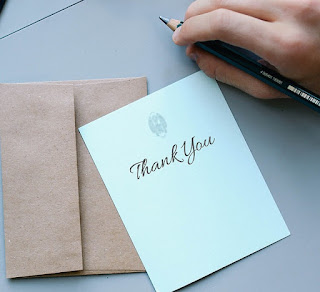How to write an interview thank you letter
Many people mistakenly think once the interview is over the application process is done. But there is still one more important step: the thank you letter. Not sending a thank you letter to the person(s) who interviewed you is considered by many hiring managers as a good way to eliminate yourself from the applicant pool.
Consider your thank you letter following an interview is as important as constructing a good resume and cover letter, if not more. Not only is it courteous, but also good business etiquette. Even if your interview ended on a positive note, the thank you letter could be the final determinator. If your competitors are sending their letters, keep in mind, they'll be the ones leaving the best impression at the close of the interview process.
Even more, most recruiters and hiring managers expect to receive one. If you don't send one, even in a candidate-driven hiring environment, you'll leave a negative impression of yourself. Additionally, remember, it's not just sending a letter, quality matters. A bad thank you note can hurt your chances. Once you send out your thank you letter and it has been received, you can then consider the interview process complete. At this point, take a deep breath and cross your fingers you get the job.
Bottom line, as you write your thank you, keep in mind how valuable this document is and give it the same serious attention you give your resume and interview prep.
 |
| Image credit: Pixabay |
Value of an interview thank you letter
Aside from being thoughtful and demonstrating good business etiquette, the thank you letter provides you with a terrific opportunity to further promote yourself. You can:- Reiterate why your skills would add value to the organization
- Keep your name visible after the interview is complete
- Leave a positive impression of yourself with the interviewer
How to write your thank you letter
While you want to customize your letter, there are some important generalized elements you want to include.- Don't delay. After your interview is over if you haven't constructed a basic outline yet, start constructing your thank you letter immediately. Ideally, you want to write your letter within 24 hours after the interview.
- If more than one person interviewed you, send individual notes to each.
- Always thank your interviewer for their time. Be genuine.
- Use specifics from the interview in a positive way.
- Keep your letter concise and to the point; be careful about being overly wordy.
- Reiterate the reasons why you would be an asset to the organization. This shouldn't be a long paragraph, be brief. Don't dwell on your skills and accomplishments since they've already received your resume.
- Highlight an attribute or two about the organization which impressed you.
- State you are happy to send any additional information they may need regarding your qualifications or other details.
- Let your interviewer know you are accessible to talk further and you look forward to hearing from them.
A completed process
Unfortunately, many job seekers aren't aware of the urgency of sending out this important piece of correspondence to their potential new employer as completing the process. Between job searches, filing applications and going on interviews, many people push the thank you letter to the backburner. According to a 2016 CareerBuilder survey, 57 percent of applicants neglect to send a thank you letter. In 2017, another survey found a whopping 75 percent of interviewees didn't send one.Even more, most recruiters and hiring managers expect to receive one. If you don't send one, even in a candidate-driven hiring environment, you'll leave a negative impression of yourself. Additionally, remember, it's not just sending a letter, quality matters. A bad thank you note can hurt your chances. Once you send out your thank you letter and it has been received, you can then consider the interview process complete. At this point, take a deep breath and cross your fingers you get the job.
Bottom line, as you write your thank you, keep in mind how valuable this document is and give it the same serious attention you give your resume and interview prep.



Comments
Post a Comment